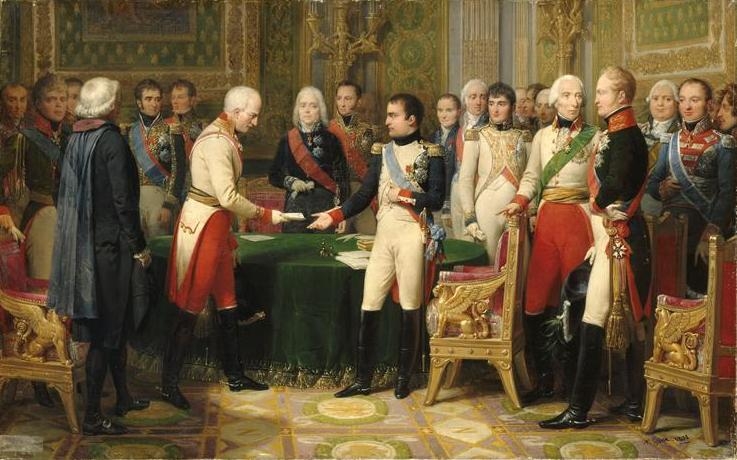A Brief History of Thüringen | Designer | Office Furniture | Producer | Product | smow | Thonet | USM Haller
In 1808 Napoleon had a problem.
Or better put, in 1808 Napoleon had a whole continent of problems.
Spain, Austria, Finland, England, Russia, Germany, Turkey. Noone it seemed was behaving in a manner that fitted with Napoleon's grand, global plans.
How, for example, was he ever to find the time to conquer India if Europe wouldn't just quietly accept French domination?
In an attempt to, at least partially, find a way out of the chaos a meeting was organised with Tsar Alexander I of Russia to discuss the situation and to secure a new peace treaty and strategic alliance between the two empires.
At the Tsar's suggestion the chosen location for the meeting was..... Erfurt.
While admittedly never the most glamorous European metropolis, Erfurt marked the eastern border of the French Empire at that time, and as such was a logical choice for such a meeting.

The Congress of Erfurt was arranged for late September 1808 and the French hosts planned the summit with the same proficiency as they planned battles: with the exception that instead of machines of war "... a large quantity of magnificent furniture, carpets and tapestry, both Gobelin and la Savonnerie; bronzes, lusters, candelabras, girondoles, Sevres china; in fine, everything which could contribute to the luxurious furnishing of the two Imperial palaces, and those which were to be occupied by the other sovereigns; and a crowd of workmen came from Paris."
Napoleon himself departed Paris on September 22nd 1808 and arrived in Erfurt on September 27th. Following a brief exchange of pleasantries with the event's, nominal, host, King Friederich August von Sachsen, he set off to meet Alexander.
The Tsar had departed Saint Petersburg on September 17th, reached his sister, the Grand Duchess Maria Pawlowna, in Weimar on September 25th, and was now on his way to Erfurt.
The two Emperors met under a pear tree near Utzberg and according to all reports of the day greeted one another with an almost fraternal tenderness.
And while we're generally distrustful of any sources older than ourselves, the accounts of the Congress of Erfurt do contain the most wonderful references to the warm nature of Alexander and Napoleon's relationship.
For example, aside from tell of the regular gifts the pair presented one another, we learn from Louis Constant Wairy that most mornings Tsar Alexander visited Napoleon in his bedroom and that one morning "....Emperor Alexander remarked on the elegance and durability of his Majesty's iron bedstead; and the very next day by his Majesty's orders, conveyed by me, an exactly similar bed was set up in the room of the Emperor of Russia, who was delighted with these polite attentions."
Which is just a wonderful insight into the sort of small talk Europe's leaders engage in.
And of course the relative ease with which one could, in the 19th century, acquire contemporary furniture in Erfurt.
The Congress itself ran less brotherly and ended on October 14th 1808 without any clear results, a trend loyally continued by political summits 200 years later; however, the diplomatic discussions formed only one part of the proceedings and so John Holland Rose could, with only a hint of irony, report "Napoleon's chief triumphs at Erfurt were social and literary"
Before departing Paris Napoleon - so it is conveyed - had ensured that the discussions would be accompanied by an entertainment programme befitting the stature of his guests.
In addition to the de rigueur dinners and receptions, the ensemble of the Comédie francais were sent to Erfurt to perform "the masterpieces of the French stage" for the assembled Kings, Princes, Dukes, Counts, et al. To this end Napoleon ordered that the Ballhaus in Erfurt's Futterstraße be refitted as a Royal Theatre for the occasion.
The plays began at 7pm every evening. At least in theory. For as Constant notes, "the two Emperors, who always came together, never arrived till half-past seven." At which point the performance began.
Presenting a repertoire of works by the likes of Racine, Corneille and Voltaire, the Comédie francais not only wowed the audience but, and more importantly, also played an important role in helping establish French culture in Germany. Culture as politics.
In this context it is important to note that aside from European Royalty, the three hundred or so guests in theatre counted amongst their number the artistic and literary luminaries of the day, including, most famously, Johann Wolfgang von Goethe. But that is a story for another post.
The building in the Futterstrassse where Napoleon was able to claim at least a modicum of success from the Congress of Erfurt still exists, re-christened the Kaisersaal in honour of events of that fortnight in 1808 when Erfurt was the "focus of European politics", and some 200 years after Napoleon I, Alexander I, Goethe et al graced its floors still hosts congresses, theatre and cultural events of all shades and colours.
And since recent renovations also hosts furniture as elegant and durable as any Napoleonic iron bedstead: USM Haller and the Thonet S 360 chair by Delphin Design.......